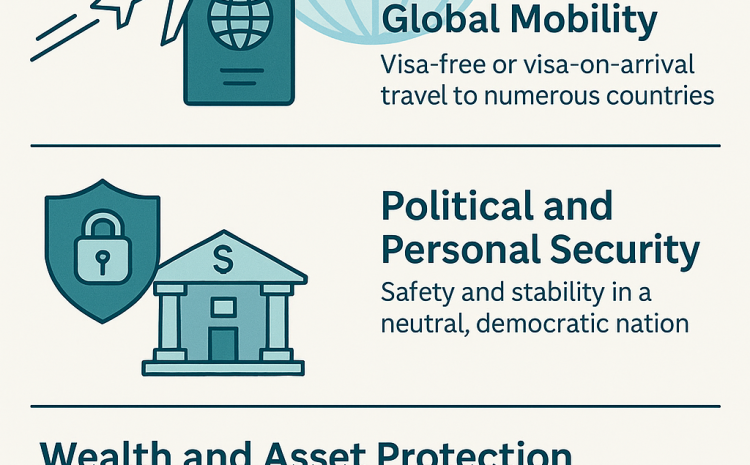
介绍
In today’s rapidly changing global landscape, the idea of belonging to just one nation is increasingly being questioned by entrepreneurs, families, and forward-thinking individuals alike. With rising geopolitical tensions, economic instability, unpredictable policy shifts, and tightening travel restrictions across regions, the pursuit of a second citizenship has transformed from a symbol of luxury into a practical and strategic asset. It is no longer simply about owning a second passport—it’s about securing freedom, preserving wealth, ensuring personal safety, and unlocking global opportunities.
A second citizenship can offer a world of benefits, including greater mobility through visa-free travel, access to better healthcare and education systems, legal protection in times of unrest, and favorable tax regimes. For high-net-worth individuals, business owners, digital nomads, and globally minded families, second citizenship can serve as a powerful hedge against uncertainty and a bridge to a more resilient, borderless lifestyle.
This comprehensive guide explores secure second citizenship pathways—legal, structured, and vetted routes that lead to dual nationality. We will delve into the most reliable programs available, the strategic advantages they offer, and the practical considerations to keep in mind as you evaluate your options. Whether your goal is financial diversification, family safety, or lifestyle flexibility, understanding these pathways is the first step toward designing a life that transcends borders.
Why Secure a Second Citizenship?
Obtaining a second citizenship is no longer an abstract ambition reserved for celebrities or the ultra-wealthy. Today, it is a calculated and increasingly mainstream decision made by individuals and families who recognize the value of global access, legal flexibility, and personal protection in an unpredictable world. From safeguarding your legacy to expanding your lifestyle choices, secure second citizenship pathways offer multi-dimensional advantages.
Global Mobility Without Constraints
Perhaps the most immediate and tangible benefit of second citizenship is dramatically increased global mobility. For citizens of countries with limited passport strength, travel often involves visa applications, consulate appointments, long processing times, and the looming risk of denial. This can hinder business expansion, spontaneous travel, and even family emergencies.
A second passport can eliminate these barriers. Depending on the country, it may grant visa-free or visa-on-arrival access to over 150 nations, including economic and cultural hubs like the Schengen Zone, the United Kingdom, Singapore, and Hong Kong. For global entrepreneurs, this opens doors to international markets, cross-border networking opportunities, and client-facing flexibility. For digital nomads, it provides location independence without bureaucratic hurdles. And for families, it means simplified travel logistics and more enriching global experiences for children.
In a post-pandemic world where mobility is more scrutinized than ever, second citizenship ensures you’re not left behind due to arbitrary policy shifts or geopolitical tensions.
Political and Personal Security
No one can predict the next wave of civil unrest, economic collapse, or government overreach. Recent years have shown us how quickly political climates can change—even in developed countries. Natural disasters, violent protests, or abrupt policy changes can disrupt lives overnight. For individuals residing in unstable or semi-authoritarian nations, the lack of civil liberties, freedom of speech, or even the threat of conscription can create long-term uncertainty.
Holding citizenship in a politically stable and neutral country provides a legal and logistical escape hatch. It offers peace of mind, knowing that you and your loved ones have an alternative place to relocate if needed. This is not merely about geographic movement, but about securing your legal identity under a framework that upholds human rights, judicial fairness, and democratic values. In extreme cases, it could be the difference between freedom and restriction—or even between safety and danger.
A second citizenship is one of the few tools that can provide real-time protection without having to rely on external entities or international asylum systems.
Wealth and Asset Protection
Global citizens must increasingly think beyond borders when it comes to financial planning. Governments are introducing stricter capital controls, unpredictable currency regulations, and retroactive tax policies. For entrepreneurs and high-net-worth individuals, remaining financially agile requires more than just offshore accounts—it requires jurisdictional diversification.
Second citizenship offers access to international banking systems, investment opportunities, and favorable legal frameworks. Some countries with citizenship-by-investment or residency programs also feature tax neutrality on foreign income, inheritance, or capital gains. This is particularly attractive for those who want to legally reduce their tax exposure while remaining compliant with international financial laws.
Furthermore, second citizenship allows for strategic estate planning. It can help secure generational wealth transfers, structure international business holdings, and establish multi-jurisdictional legal presence—all of which enhance resilience in an uncertain global economy.
In short, it’s not just about saving money; it’s about protecting what you’ve already earned and preserving it for the next generation.
Quality of Life
Beyond the legal, financial, and geopolitical advantages lies a more human aspiration: the pursuit of a better life. A second citizenship can unlock access to exceptional healthcare, cutting-edge education systems, clean environments, and vibrant cultures.
Families often pursue citizenship in countries that offer world-class public and private schools, ensuring their children have access to international curricula, top universities, and future job markets. In many countries with strong passport programs, education is either heavily subsidized or free at the tertiary level for citizens.
Retirees often choose second citizenship as part of their retirement planning, relocating to destinations with affordable healthcare, temperate climates, and strong community life. Many countries offer healthcare coverage to citizens that rivals or exceeds that of private insurance in cost and quality. For aging individuals, this becomes a defining factor in maintaining dignity and wellness.
Even digital professionals and younger adults are drawn to second citizenship as a way to live in places with better work-life balance, safer cities, and a more enriching social landscape. The ability to choose your lifestyle—rather than be limited by a single jurisdiction’s policies—is one of the greatest freedoms second citizenship provides.
Common Secure Second Citizenship Pathways
There are several legal routes available for those seeking a secure second citizenship. Each comes with its own set of requirements, benefits, and strategic considerations. Below are the most commonly used and internationally recognized pathways, along with key insights to help you determine which option aligns with your long-term goals.
1. Citizenship by Investment (CBI)
Citizenship by Investment is one of the fastest and most structured ways to acquire a second passport. Under this model, individuals are granted full citizenship rights in exchange for a significant economic contribution to the host country. This contribution may take several forms:
- Non-refundable donation to a government development fund or national transformation fund.
- Investment in government-approved real estate projects, often with a holding period of 3 to 5 years.
- Equity participation in local businesses or startups that generate employment and stimulate the economy.
CBI programs are specifically designed to attract foreign capital while maintaining national security through strict due diligence protocols. Countries offering these programs conduct comprehensive background checks and require applicants to prove the legal origin of funds.
Popular destinations include Caribbean nations such as St. Kitts and Nevis, Antigua and Barbuda, Dominica, and Grenada, as well as European nations like Malta. These programs boast rapid processing times—some granting citizenship in as little as 3 to 6 months—along with minimal or no physical presence requirements.
CBI is ideal for entrepreneurs, high-net-worth individuals, and global investors seeking immediate access to a stronger passport, favorable tax regimes, or geopolitical diversification.
Visit our Citizenship by Investment page for an in-depth overview of countries, timelines, and investment tiers.
2. Residency by Investment (Golden Visas)
For those not in a rush to obtain citizenship but who value the stability and privileges of legal residency in another country, Residency by Investment—commonly known as Golden Visa programs—is an appealing pathway.
These programs allow individuals to gain temporary or permanent residence status in exchange for qualifying investments, which typically include:
- Purchasing real estate above a designated value threshold.
- Investing in local businesses, job creation, or capital funds.
- Making deposits in local financial institutions or contributing to research, technology, or cultural preservation.
Unlike CBI programs, Golden Visa schemes usually require a longer time commitment before full citizenship can be obtained. The path typically includes several years of legal residence (usually five to seven), after which applicants may become eligible for permanent residency and ultimately apply for naturalization.
Golden Visa countries include Portugal, Greece, Spain, Italy, and more recently, nations like Panama and the UAE. These destinations are especially popular for their lifestyle appeal, access to European markets, and family-friendly immigration policies.
Applicants enjoy the right to live, work, and study in the host country and, in some cases, travel within wider regions such as the EU’s Schengen Zone. Additionally, many Golden Visa programs allow family reunification, enabling spouses, children, and even parents to benefit under the primary investor’s application.
For more insights, explore our Residency Options tailored to global investors and their families.
3. Citizenship by Descent
One of the most overlooked but highly valuable pathways to second citizenship is through ancestry—also known as citizenship by descent. Many countries grant nationality to individuals who can prove direct lineage to citizens, often within two or three generations.
This route has several distinct advantages:
- Cost-effectiveness: It typically involves only administrative and legal fees, with no mandatory financial investment.
- Legal security: Citizenship obtained through descent is treated on equal footing with citizenship by birth in most jurisdictions.
- No residency requirement: In most cases, applicants do not need to relocate or spend time in the country to claim citizenship.
Countries that commonly offer citizenship by descent incluseconde Ireland, Italy, Poland, Lithuania, and Argentina, among others. Some have broader definitions of lineage, allowing eligibility through grandparents or great-grandparents, while others may only accept direct parent-child claims.
This route is especially appealing to individuals with multicultural heritage or family histories linked to countries with strong passports and economic stability. However, the process often requires extensive documentation, such as birth, death, and marriage certificates, often translated and apostilled. Patience and precision are key.
At William Blackstone Internacional, we assist clients in tracing their ancestry and managing the bureaucratic process involved. For those eligible, this route represents one of the most strategic and affordable ways to secure a second citizenship.
4. Naturalization Through Long-Term Residency
Naturalization is the traditional method of obtaining citizenship based on prolonged legal residence, cultural integration, and contribution to the host society. This process varies widely between countries, but generally includes:
- A continuous period of residency (ranging from 3 to 10 years).
- Demonstrated language proficiency and knowledge of the host country’s history, laws, or culture.
- Evidence of social and economic integration.
- A clean criminal record and consistent tax compliance.
Although the process is slower and often more rigorous than CBI or ancestry-based pathways, it is ideal for individuals who have already relocated or plan to build a long-term life in a particular country. This includes remote workers, retirees, international students, and expatriates who have embedded themselves within a community.
Some countries also offer expedited naturalization options based on marriage to a citizen, military service, or exceptional contributions to society—such as in the fields of science, sport, or the arts.
This path appeals to those who are not necessarily seeking a “fast-track” solution, but rather a meaningful long-term connection to a new nation. It is often the most accessible route for middle-income families, younger professionals, or those with personal reasons to reside in a specific country for an extended period.
Choosing the Right Pathway
Each citizenship route comes with its own timeline, requirements, and benefits. The optimal path will depend on your goals, risk tolerance, family situation, and financial capacity:
- Looking for speed and flexibility? Consider Citizenship by Investment.
- Interested in European access without immediate citizenship? A Golden Visa might be right.
- Have family roots abroad? Explore Citizenship by Descent.
- Already living abroad or planning to relocate long-term? Look into Naturalization.
No matter your profile, securing a second citizenship is an investment in freedom, legacy, and security. At William Blackstone Internacional, we offer personalized strategy sessions to help you understand which pathway aligns with your vision for the future.
Key Considerations Before Choosing a Pathway
Financial Commitment
Citizenship and residency programs vary widely in cost—from $100,000 donations to multi-million-dollar real estate portfolios. It’s essential to evaluate your budget, long-term ROI, and legal compliance before committing.
Dual Citizenship Laws
Not all countries permit dual citizenship. Some require you to renounce your original nationality, while others allow it freely. Understanding the compatibility of citizenship laws between your current country and your destination is vital.
Family Inclusion
Most programs allow for the inclusion of spouses and dependent children—but the definition of “dependent” varies. Some allow adult children or elderly parents; others don’t. It’s critical to plan for your entire family’s needs from the outset.
Tax and Legal Implications
Second citizenship may alter your global tax obligations. While some countries impose taxes on worldwide income, others offer tax incentives to attract new citizens. Consulting with legal and financial experts ensures you remain compliant while optimizing your global tax structure.
Example Scenarios: Who Benefits the Most?
Entrepreneur Seeking Global Expansion
A technology founder from Asia obtains citizenship in a Caribbean nation. With a new passport offering access to over 140 countries visa-free, they’re now able to meet investors, attend conferences, and sign deals in key regions without delay or visa wait times.
Family Relocating for Education and Safety
A family from a politically unstable region gains citizenship in a European nation through investment. Their children now attend top schools, and the family enjoys peace of mind, knowing they have secure legal status in a stable, democratic society.
Retiree Diversifying Lifestyle and Wealth
An American retiree secures residency in a low-tax country through a real estate purchase. Over time, they naturalize, enjoying a high standard of living, robust healthcare, and a simplified estate transfer plan for their heirs.
How to Choose the Right Path for You
The best path depends on your goals:
- If speed and mobility are priorities, a Citizenship by Investment program may be optimal.
- If you want an affordable, long-term relocation option, Golden Visa or Naturalization programs might be better.
- If your heritage qualifies you for citizenship by descent, it’s often the simplest and most affordable route.
No matter the path, due diligence, expert legal assistance, and a clear understanding of personal and financial objectives are key to success.
Explore our curated Comparison of Citizenship Programs to help evaluate your options.
Conclusion: Your Global Future Starts Here
Secure second citizenship pathways are no longer reserved for the ultra-wealthy or politically connected. With structured programs available in dozens of countries, legal access to a second nationality is now a powerful tool for financial security, freedom of movement, and long-term resilience.
William Blackstone Internacional has helped numerous clients—from investors and families to retirees and entrepreneurs—secure their future through tailored citizenship and residency strategies. Our deep expertise ensures you navigate every stage of the process with clarity, compliance, and confidence.
Whether you’re just beginning your exploration or ready to act, we invite you to visit www.wblackstone.com to learn more and begin your journey today.













